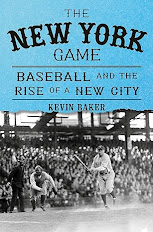From the desk of DickAllen:
After so many innings of the World Series, it was pointed out somewhere that the infields of both teams have played together consistently for the past several years, even going so far to point out that the Asstros infield has surpassed the Yankees infield of the late 90s in playoff games together, though I believe that Yankees tandem included Posada. I can't be sure of that. No doubt one of you will set me straight on that score.
Of course, it got
me to thinking about consistency and what makes for a championship team, an
idea that seems to be lost on the Yankees alleged brain trust and analytics
geniuses, none of whom are baseball people. I do not consider The Intern a
baseball man. A bureaucrat, a second vice president in charge of sitting by the
door; a wax figure of a man. A man who does not have baseball in his blood. Not
that having baseball in your lineage will guarantee any real merit (see:
Boooooone, Aaron).
What constitutes
consistency in a team? Regular work together. Over a considerable period of
time. For example, this year, the Asstros had Guirrel at 1B for 142 games,
Altuve at 2B for 144, Correa for 148 at SS, and well, 3B was manned largely by
Bregman for only 90 games (and he was one of four who played double digit games
at that position).
The Braves, on the
other hand, had Freeman at 1B for 159(!) games, Albies for 156 at 2B, Swanson
at SS for 156, and Riley for 156 games. That is pretty astonishing, and they
have largely been together for the past three seasons with one or two notable
exceptions, mostly at 3B.
This year, the
Braves infield combine for a cumulative 16.4 WAR while the Asstros garnered a
total 17.4 WAR at the four infield positions. The Asstros have won their
division four of the last five years and the Braves have won their division in
each of the last five seasons.Both teams where a model of consistency.
Which brings me to
your 2021 New York Yankees:
Who had SIX
different players at first base, led by the incomparable swiss-army glove of
DJ. I won't bother naming the other five. You know who they are.
Second base had
FOUR different players man second base, led by the incomparable swiss-army
glove of DJ. Again, the other three imposters are not worth naming.
Another FOUR
different players played shortstop, and none of them, amazingly enough, was
named DJ.
Third base was
also manned by FOUR different players, DJ coming in second in games at the hot
corner behind Gio.
So, think about
this: while the two teams playing for the ring this year each had four guys
playing together all year AT THE SAME POSITIONS, the Yankees had EIGHTEEN
different players man the infield, led by the incomparable swiss-army glove of
DJ who believe it or not, actually managed to get credit for playing in 177
games at different positions – a feat I didn't think was possible, but there
you have it - you could look it up.
While I grant that
there are any number of other factors go into making up a championship caliber
team, having a steady presence at several key positions, particularly at short,
second and first is a key ingredient to winning. Without that steady,
productive presence, you might very fall short of getting to the World Series.
As an aside, I
don't think catcher impacts the game as much as those three positions – the
Braves have had a NEGATIVE 1.0 WAR behind the plate while the Astros had a
positive 0.7 back there (for your information, the Yankees had a combined
positive WAR of 1.1 at catcher, so complain all you want about what Gary is and
is not, he has been productive). I personally don't want to hear any more nonsense
about bringing back Romine or trading Gary. Neither one of them is Johnny Bench
to be sure, but the Yankees have far more problems than catcher.
I'm inclined to
spread some blame around for this terrible lack of consistency, a
characteristic that makes for championship baseball in my opinion. Analytics
seems to think that a professional baseball players should be capable of
playing anywhere (which is only true if your name begins with the initials DJ),
and it has filtered down to the dugout where our current Management Trainee
dances to the tune of the front office, a group of men who devoutly rely on
their collective inexperience. Think of it: the Yankees are owned by a man with
no desire to win, run by an Intern who has had only on-the-job training, an
analytics department run by MBAs, and a manager who had never managed before.
It is no wonder they are running a clown car on the diamond.
You want to win
baseball games at a high level? Draft (not buy) for position, play them
together for an extended period, and don't move them around every week like
chickens in a barnyard. Hit guys in the same order in the lineup every day.
Baseball players are creatures of habit and notoriously superstitious. They see
the field from a specific point of view and you can't just stick them anywhere
on any given day. They just won't be as productive. A third baseman is not
going to be a terrific left fielder; maybe some will, but I think most won't
and until the Yankees can establish some model of consistency, they will continue
to remain also-rans.
P { margin-bottom: 0.08in }










































29 comments:
Okay. Time for me to move into the modern day baseball genre. What is WAR?
Please don't say; " wins after replacement."
I don't know what that means either.
Is a high number good or bad?
Just give me something simple.
Or a Manhattan.
It's "Wins above replacement." But it is, to me, a dubious statistic. Almost everyone has a positive WAR, meaning that, like the children of Lake Woebegone, almost all major-league players are above average.
Interesting analysis, Dick.
As for the historical value of consistent starters? Hard to say.
The great 1936-39 Yankees teams, for instance, had to change on the fly. Joe "Flash" Gordon replaced Tony Lazzeri at second base for the 1938-39 seasons—a positive upgrade. Babe Dahlgren had to replace Lou Gehrig at first for 1939, which of course was a huge downgrade—but one that made no difference in the Yanks dominating the AL and sweeping the World Series.
And those Yankees probably stayed with what worked for too long. Phil Rizzuto really should have replaced the declining Frankie Crosetti at short in 1940—a year when the Yanks lost the pennant by two games—as opposed to making the change the next year...
In the 1950s, on the other hand, the Yanks went with Casey Stengel's constant platooning and substituting in the infield, and had a lot of players who could play reasonably well at different positions.
Gil McDougald, for instance, made All-Star teams at second, short, and third. There were constantly other guys like Jerry Lumpe and Bobby Richardson who could be slotted in all over the place.
Looking back at it, you'd have to say both the 1930s and the 1950s teams' player use suited the organizations that produced them.
By the mid-1930s, the Yankees were consistently producing players who were the best or close to the best at their positions. The strategy, unsurprisingly, became just to put them out there and let them dominate.
By the 1950s, that elite edge was mostly gone—but the Yanks were able to come at teams in waves, producing incredible depth that a very smart field manager was able to use adroitly...
In the 1990s, of course, Jeter was an elite shortstop. Tino was a very steady hand at 1B, if not the best there.
The starters at second and third were more varied—but Yankees GMs were able to slot new players in effectively. In short, consistency matters—but so does a GM able to come up with a good replacement when a part goes sour.
Dick Allen writes, "Analytics seems to think that a professional baseball players should be capable of playing anywhere." This is completely false--the statement of someone who has never actually read anything first-hand on the subject of analytics.
Alphonso, WAR stands for Wins Above Replacement. It basically means that a player is worth x amount of wins for a team above what an "average" player would produce. I don't know how it's calculated, but it seems to a pretty standard definition of how much a player is worth to a team these days.
But have the Manhattan (or two) while we contemplate the future. Maybe more.
Horace, the real catch is having quality players at those critical positions. Platooning works well when there isn't a consistent player creating value by himself at any given position. The Rays are a perfect example of using multiple players at a position to greater effect when they don't a solid everyday at a spot. They used three different players at 3B for a collective 6.4 WAR and five different players at 1B with less success but still respectable at 3.3 WAR. Even the Sux had success, though less so, using six different players at 1B and 2B, but Devers and Bogaerts more than made up for that deficiency. Two players the Yankees simply don't have to offset the clown car mentality they exhibited this past season.
I still can't help but feel that having greater consistency at those spots makes for a better team. There will always be variations that work well, as you pointed out so clearly.
And thanks for the insult Barney.
Nice that you offered an opinion without any evidence to the contrary.
HC66, another guy who has never read a book on analytics (by his own admission), writes, "But it is, to me, a dubious statistic. Almost everyone has a positive WAR." This is ridiculous. It's like saying batting average is a dubious statistic because almost everyone hits over .200--that's completely devoid of logic. The Yankees are saddled with a shitload of players with WARs below ONE--meaning barely better than a replacement player: Hicks (minus territory), Rizzo, Gallo, Higashiokia, Urshela, Torres, Wade, Odor, Voit. Gardner is at exactly 1, which also stinks. They have only three regular players above the 1 threshold: Judge (5.9), Stanton (3.1), LeMahieu (1.5).
I'm sure HC66 has no idea what goes into making up the WAR stat, and has never bothered to look it up. Because it was devised after 1966, he has no use for it--that's the extent of his "analysis" of this issue, about which he pompously opines in a void of actual knowledge.
I've read a whole library on the subject of analytics and have NEVER seen anyone assert that players ought to be able to play any position. YOU are the one making this preposterous assertion--can YOU offer a citation to source for it?
Dick Allen: Here's a useful summary--from ten years ago, so not completely up to date--on the evolution of advanced analysis of defensive performance in baseball. If you can find anything on the idea that anyone expects players to be able to field any position, please report this to SABR or Baseball Prospectus, because they seem to be unaware of it.
https://sabr.org/journal/article/measuring-defense-entering-the-zones-of-fielding-statistics/
I'm talking about the Yankees "analytics" geniuses who moved so many players into unnatural positions, not anyone remotely interested in SABRmetrics, which I don't think the Yankees are using very effectively.
The fact that so many players were moved around so freely speaks to me of ineptitude, yet they cling to this idea of moveable objects. I wasn't criticizing analytics itself, only the Yankees use of it.
And thank you for responding so well. We simply don't need insults. I realize that my essay would provoke some responses. Good or bad. So be it.
The Yankees don't have any analytics "geniuses." Their analytics ghetto is a joke, and the team does not operate by any sound analytics principles, which is why they suck year after year--and the teams that are really steeped in analytics--don't just have an analytics ghetto run by an incompetent--kick their asses all the time.
And I did not insult you. YOU insult analytics with these scattershot, uninformed swipes when it's obvious that you don't understand the entire field and don't know much about it. That's not an insult--it's an accurate appraisal of your comments on this subject.
Alright, who let Buzz Killington in?
"Clown car" is a good description, Dick Allen! Nor do we have a Casey Stengel—or even a Ralph Houk—in the dugout to sort things out.
I guess the Yanks would argue that they were forced to do this thanks to injuries, which is partly true—but only leads to the question of why they always have so many injuries.
At the core of their infield problems, though, has been there certainty that Gleyber Torres is the shortstop of the future...when he can't seem to play shortstop at all.
I guess they have finally conceded this—though now the question will revert to whether he can still play 2B. If he can, and say they sign Correa, then they might have DJ, the old Gleyber, Correa, and Urshela, which might make for a pretty fair infield.
If they re-sign Rizzo as well, then they would have all that as well as LeMahieu as the moveable piece, and Wade and Velazquez as the back-ups, which to me could be the sort of depth and strength necessary to get through the exigencies of the long season. But I doubt if they'll want to spend the money.
Right now, the Astros hidden buzzers are giving them the message, 'Hey you guys we're being royally fucked at home!'
While all the results aren't in, the Associated Press is projecting the Atlanta Braves as World Series champs. No concession speech from the Astros yet, though.
Buzz Killington--or the only guy who has actually read a sentence on analytics that didn't come from a third-hand deadhead.
Nearly everyone on this blog seems to subscribe to this "definition" of analytics: everything Brian Cashman does wrong. That is just DUMB. It's everything that Tampa Bay and LA and Houston et al. do RIGHT.
Barney, how would you or any fan "know" if a team had a good or bad analytics department? Fans can't know, so enough.
Players who can play multiple positions are "nice", but it largely is only seen when a team is beset by injuries. By itself, planning a team like that is fitting sub-optimal pieces together, with results which match the concept.
The 1970's Dodgers were another team whose infield was together FOREVER. That being mentioned, infields that are together for a long time are together because of talent, health, and ownership who will pay for their services.
"Barney", it's obvious that you are the same argumentative, nasty newbie who thinks that she invented the wheel. Opinions are one thing, but your inevitable personal attacks got old a LONG time ago. Young lady, why don't you pick up and read "Miss Manners", and learn to make yourself welcome? Kevin
PS, "Barney", over the past six or so months that I've tangled with you I've noticed that you always are wanting others to give "sources". In fact you did earlier on this thread when you asserted that you've read "volumes" of books on analytics (BULLSHIT) in a SALVO to HC66. But true to YOUR HISTORY, you didn't give a source of your own, and I've never seen you ever do so. It's obvious that your understanding of analytics, and the game of baseball is spread ever so thinly, like a small amount of butter on toast. Cut the posturing, you sound ridiculous.
KEVIN
Well, just a simpletons point of view but looks to me as if Atlanta won tonight doing exactly what the Yankees do, hit home runs. What has baseball come to?
I think I understand WAR, but I'm not sure what it adds to my comprehension of the NYYs and their awfulness.
I don't need a number to quantify Joey Gallo's performance. It's a big freaking Zero.
I don't need a number to identify how stupid it was to sign Hicks to a long contract.
I might need an explanation of how DJL went from seemingly sorta good to awful. Does WAR provide that? But then again, it's not the first time I've seen the performance of a guy signed to a 6-year, $90million-ish contract -- setting his family up for life for several generations hence, if you think about it -- fall off a cliff.
WAR won't tell me what went into the brain of Brian signing a 35-year-old Kluber. It won't tell me why they didn't get rid of Aroldis (a 2nd time) when they had the chance. It won't answer questions I have about the shedding of Kaprelian, and how the heck Eovaldi sucked with us and did well with the Sox.
And I'm not sure what WAR could tell me, if anything, about all of those baserunners thrown out at home plate. Or about why they kept Sanchez. And how a team hopes to succeed with all of those freaking strike-outs.
Was the decision to keep Gleybar at SS based on WAR? If yes, then WAR sux. If NO, then the analytics people -- combined with Cashman -- really, really don't know what they are doing.
I am probably wrong, but it seems to me that WAR doesn't provide better evidence of incompetence -- in the field, in the field manager, in the general manager, and the coaches, etc. -- then what my eyes regularly saw in 2021.
And: Quantified or visualized, reality-wise or numerically calculated -- I'm really, really tired of looking at all of that crap.
Dick Allen, a postscript: I've been to the circus. A clown car is more entertaining than what we saw in 2021 (altho I'm not sure 162 days of clown car follies wouldn't wear just a bit thin . . . ).
Sorry I opened these comments
Joe FOB, I think you cut to the heart of the matter. We can all talk about stats until we're blue in the face. And obviously some front offices analyze them better than others'.
But what it comes down to is:
—You need to find a way to keep your best players healthy and on the field.
—You need people able to analyze talent firsthand—to look at them and decide this or that individual has the physical talent and mental acumen to succeed, long term.
The Yankees quite obviously don't have either, and Brian Cashman seems incapable of providing them with either, based on the very long sample of 24 seasons.
HC66, methinks that you just might be on to something...
That average player seems to be below average as almost every player is statistically better.
If management thinks baseball is all launch angles and spin rates, then that's what they emphasize in baseball development. Ergo, nobody can play their position, learns how to run the bases or has the slightest awareness of situational thinking. Or how to win.
But the worst part of this sabermoron thinking is that is also leads to lots of injuries, because their math-driven definitions of baseball 'excellence' leads to injury after injury after injury. Sure you can make the ball spin quicker. But at what point does that motion tear up a pitcher's arm?
So, it makes no damn difference if you spent a half billion dollars on a player or you picked him up on wavers for a six pack of beer. Leave him in the hands of Yankee management and they will injure him badly. Because no one in management has the commonsense to understand and are too sociopathic to care.
Sabermetrics leads to injuries as surely as driving drunk leads to car crashes.
And, of course, management doesn't know how to lead or build a championship team, either (never mind the boredom of bad, sabermoron-driven baseball). So this team will never enjoy another trophy until the top floor gets cleared out and baseball veterans are back in charge.
If management thinks baseball is all launch angles and spin rates, then that's what they emphasize in baseball development. Ergo, nobody can play their position, learns how to run the bases or has the slightest awareness of situational thinking. Or how to win.
But the worst part of this sabermoron thinking is that is also leads to lots of injuries, because their math-driven definitions of baseball 'excellence' leads to injury after injury after injury. Sure you can make the ball spin quicker. But at what point does that motion tear up a pitcher's arm?
So, it makes no damn difference if you spent a half billion dollars on a player or you picked him up on wavers for a six pack of beer. Leave him in the hands of Yankee management and they will injure him badly. Because no one in management has the commonsense to understand and are too sociopathic to care.
Sabermetrics leads to injuries as surely as driving drunk leads to car crashes.
And, of course, management doesn't know how to lead or build a championship team, either (never mind the boredom of bad, sabermoron-driven baseball). So this team will never enjoy another trophy until the top floor gets cleared out and baseball veterans are back in charge.
Post a Comment